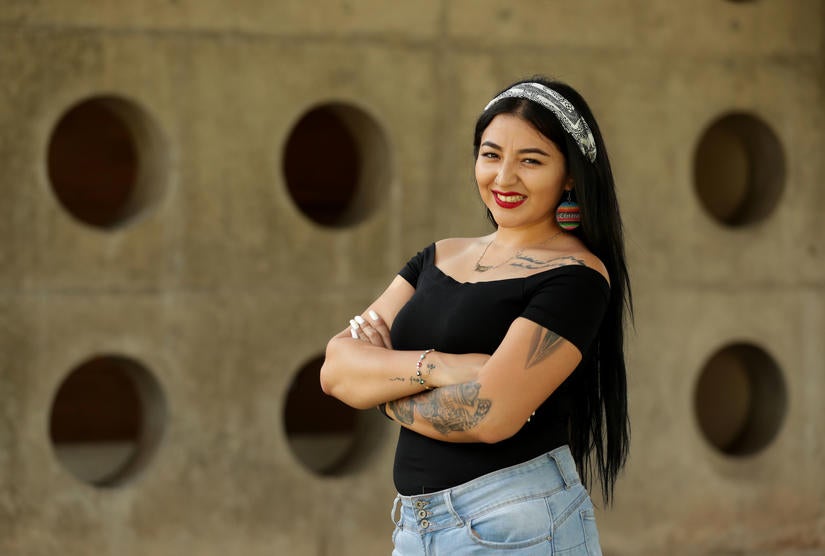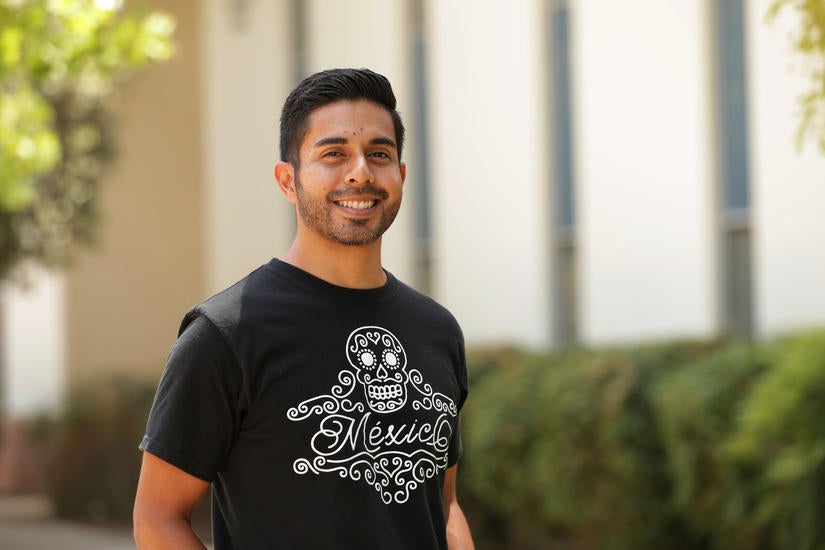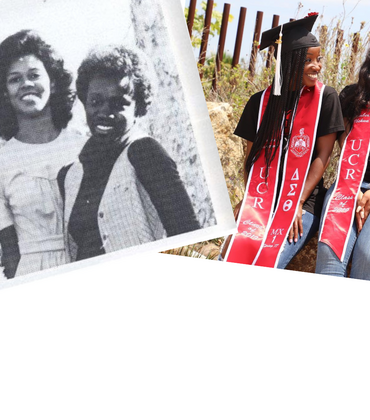
Two graduate students at the University of California, Riverside, have been named 2019 Ford Foundation Fellows. The fellowships, awarded in a national competition administered by the National Academies of Sciences, Engineering, and Medicine, provide UCR’s recipients — both first-generation college students — with a combined total of nearly $100,000 in funding to support their original research.
Katherine Maldonado, a doctoral student in UCR’s Department of Sociology, received the Ford Foundation Predoctoral Fellowship, which includes $72,000 in graduate funding over three years.
A Watts native and UCLA graduate, Maldonado examines the experiences of formerly gang-involved women who are now mothers. In her research, she explores how these women — who often bear stigmatizing marks of their previous gang affiliations, such as tattoos and criminal records — navigate their lives after leaving gangs, as well as what kinds of resources are and could be made available to better help them succeed.
“There’s a gap in the literature and knowledge about what happens to women once they’re out of gangs,” Maldonado said. “We don’t know what happens or what support systems are in place for them and their children. Because of this, it’s usually hard for women to say they’ve completely transitioned out of gangs. Their financial issues don’t just go away, and they often lack support networks, and so they continue living in the same neighborhoods and seeing the same people.”
Maldonado will use her fellowship funding to expand the breadth of her research, which until now has focused primarily on women living in Los Angeles. She’ll cross the border, traveling to Tijuana for a better understanding of what happens to formerly gang-involved mothers who are deported from the U.S. and separated from their families.
Maldonado encourages the women she interviews to talk about their lives and transitions out of gang membership using photographs — a technique that’s more conducive to conversation because it “allows them to open up and talk about stories,” she said.
“I share a similar background with many of the women I interview,” she added. “I’m formerly gang-affiliated myself, and I was a teen mom, so I share that experience with the women I interview and find it makes it easier to connect.”
In the future, Maldonado hopes her research will inform public policy for women experiencing violence. Another dream, she said, is to eventually secure funding for neighborhood centers that would help people like the women she works with, who may be on the precipice of leaving gangs, to access the kinds of resources that would ease their transitions.
“I never thought I’d be able to study what I like, help the people I love, and do something about what’s happening to them,” she said. “If my purpose here is to do that, I’ll do it — and make sure I do it right.”
Arturo Nevárez, a doctoral candidate in the Graduate School of Education, received the Ford Foundation Dissertation Fellowship, which includes $25,000 in graduate funding over one year. The fellowship will allow Nevárez to complete his doctoral degree and provide him with support as he seeks out postdoctoral and university faculty positions.
Nevárez grew up in the southeast Los Angeles cities of Huntington Park and South Gate, in what he described as mostly “working-class, Latinx communities.” After earning his bachelor’s degree from the University of Southern California, he spent several years teaching English to middle- and high school students in Hawthorne and South Central Los Angeles.
“I loved teaching,” he said. “But at these schools I felt like I wasn’t doing enough to push for racial justice, especially in regard to addressing the lack of curriculum that engages and highlights the voices and stories of people of color — stories that more closely reflect my students’ lives, histories, cultures, and the long legacies of struggle and resistance in our communities.”
The absence of these important critical perspectives at the high-school level hits home for Nevárez, as it wasn’t until the end of his own college years at USC — 15 years into his education — that he was able to take a Chicano studies course and understand what it meant to begin to have an empowering education, he said.
“That class completely opened my eyes to the possibility of curricular content and pedagogy that is personally and socially transformative,” Nevárez added. “I finally saw my community, and in turn, myself in what I was learning in school. It fueled the initial impetus for the type of work I set out to do alongside my community and with and for our students after I graduated.”
In his doctoral studies, Nevárez looks at the classroom-level implementation of ethnic studies courses for high schoolers. He aims to build on ethnic studies scholarship to highlight what needs to be part of these courses — as well as who should be teaching them — to maintain their transformative potential for students.
As part of his dissertation research, Nevárez works with ethnic studies teachers and their students at a high school in L.A., tracking what students learn based on the backgrounds and teaching approaches of their instructors. His research specifically draws on the concept of racial literacy.
“Being racially literate involves not only being able to ‘read’ or pinpoint how racial oppression structures people’s lives and opportunities at an abstract level, but knowing how to confront, navigate, and transform the institutional manifestations of the racial injustice we experience,” Nevárez said. “Given the current sociopolitical climate and the increasingly racialized experiences students of color face in our schools, my dissertation seeks to trace the role that racial literacy plays within ethnic studies classrooms and the impact teachers’ pedagogy can play in developing, sustaining, and extending our students’ racial literacies.”
Maldonado and Nevárez are among 133 recipients of 2019 Ford Foundation Fellowships. The awards seek to increase the diversity of the nation’s college and university faculties by increasing their ethnic and racial diversity, to maximize the educational benefits of diversity, and to increase the number of professors who can and will use diversity as a resource for enriching the education of all students.





